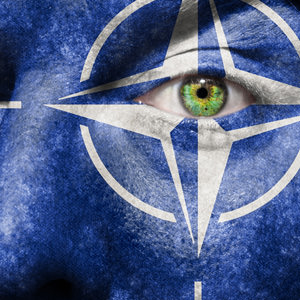Ukraine Halts Eastward Expansion of NATO
Russia's relations with the Western countries are troubled and dangerous in the Ukraine dispute, and an important opportunity may be lost.
Russia’s relations with the Western countries are troubled and dangerous in the Ukraine dispute, and an important opportunity may be lost. Russian President Vladimir Putin has recently made a spectacular return to great power politics in the Middle East, at considerable expense to the United States, and now he has humiliated the European Union. Friday’s meeting between Ukraine and the EU may be critical.
It follows Ukraine’s unexpected rejection, under Russian duress, of a long-negotiated pre-membership agreement with the European Union. Ukraine’s president, Viktor Yanukovych, unexpectedly rejected the European proposals, as did his supporters in parliament, who voted against resolutions demanded by the EU, including one that would have allowed former President Yulia Tymoshenko to leave prison and go to Germany, officially for medical treatment. Other European demands would have had liberalizing effect on Ukrainian politics.
The resolution of this affair, which has brought tens of thousands of Ukrainians into the streets, many of them students or veterans of the mass demonstrations of the 2004 “Orange Revolution,” are protesting their government’s “suspension” of an association agreement with the EU. “We are all Europeans!” “No to blackmail!” “Out with Putin!” were among the cries. There is now much doubt about the outcome of an EU meeting at the end of this week in Vilnius, Lithuania, meant to confirm agreements with Ukraine, Moldova and Georgia.
There are potential benefits to Russia in an indirect association with the EU. However, Russia has real grievances against the West, and the U.S. in particular, since the promise made by George H.W. Bush to Mikhail Gorbachev, at the time of communism’s collapse, that NATO would not be expanded to incorporate the former Warsaw Pact countries. The promise was not kept. Following German unification, membership was extended to the Germans, and the U.S. offered “limited NATO partnership” to Poland, Hungary and Czechoslovakia. This in itself gave NATO’s Czechoslovakia a common frontier with Ukraine, which was one of the component states of the Soviet Union until 1991, and previously of the Russian Empire since 1793, and an ally of Russia since the Middle Ages.
The origin of the present crisis lies in Ukraine’s history of imperial domination by Russia. For centuries, Russians have settled in Ukraine under the aegis of the tsarist and Soviet regimes. Russia has exploited ancient linguistic and religious divisions within the Ukraine, but so have other foreign powers, which Russia and Russian-speaking Ukrainians have seen as unacceptable interference in the country’s affairs.
The promotion and support by Western NGOs, and especially by Americans, of the 2004 “Orange Revolution” that first put former President Tymoshenko in office has been interpreted by President Putin as a part of an American-sponsored campaign to undermine Russia’s world position, commencing with Russia’s exclusion from the affairs of the Balkans and from the settlement of the NATO war with Serbia, another of Russia’s historical and religious-cultural allies.
With NATO already at the Ukrainian border, and Poland a vigorous promoter of NATO membership for the former Soviet states of Ukraine and Belarus, the matter became highly sensitive, implying a Western dismantling of what had been the Soviet Union itself, and before that, the Russian Empire.
A climax was reached in 2008 with a conflict between Georgia — which also had been part of the Soviet Union — and the independent territories of South Ossetia and Abkhazia, its counterpart on the Black Sea, both formerly Georgian. Georgian troops invaded South Ossetia accompanied by President Mikheil Saakashvili’s announcement on international television that the long-revendicated territories were about to reunite with Georgia.
The Russian army intervened overnight, and by dawn Georgian troops were being expelled, and the flamboyant and American-supported President Saakashvili was on CNN desperately demanding American and NATO intervention, which he seemed to expect. The disputed territories subsequently have, for practical purposes, been annexed by Russia, whose troops remain present.
Ukraine’s current conflict with the EU has come at the time of two important and positive Russian political interventions in the Middle East. The most recent was the Russian-supported agreement struck last weekend between Iran and the “5+1 states,” the UN Security Council permanent members plus Germany, on temporarily limiting Iran’s nuclear program, with modification of Western sanctions.
The second and more surprising was Putin’s intervention in the Syrian civil war chemical weapons controversy, coming at a moment when President Barack Obama was urging a bombing attack on Syria. Until then, Russia was considered a hostile intruder in the Middle East, allying itself with Iran and the Assad regime in Syria, where Russia has a small naval base.
Thanks to Russia’s sponsorship, Syrian President Bashar al-Assad renounced chemical weapons, and Russia, the UN and the Western powers newly engaged themselves in finding a solution to the Syrian civil war. All of this was totally unexpected in Washington, and resented by the community of hawks there and in Israel, but for the moment is welcomed by everyone else.
An equally constructive compromise would be welcome and could be profitable among Presidents Putin, Yanukovich and a European Union leadership until now committed, sometimes recklessly, to expansion of the EU for the sake of expansion.
Visit William Pfaff’s website for more on his latest book, “The Irony of Manifest Destiny: The Tragedy of America’s Foreign Policy” (Walker & Co., $25), at www.williampfaff.com.
© 2013 Tribune Media Services, Inc.
Your support matters…Independent journalism is under threat and overshadowed by heavily funded mainstream media.
You can help level the playing field. Become a member.
Your tax-deductible contribution keeps us digging beneath the headlines to give you thought-provoking, investigative reporting and analysis that unearths what's really happening- without compromise.
Give today to support our courageous, independent journalists.






You need to be a supporter to comment.
There are currently no responses to this article.
Be the first to respond.